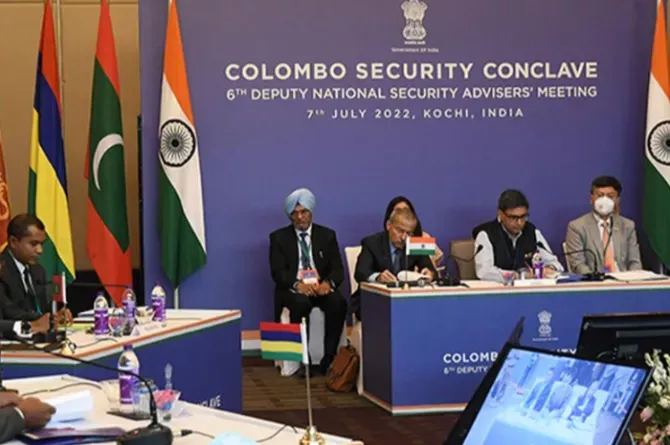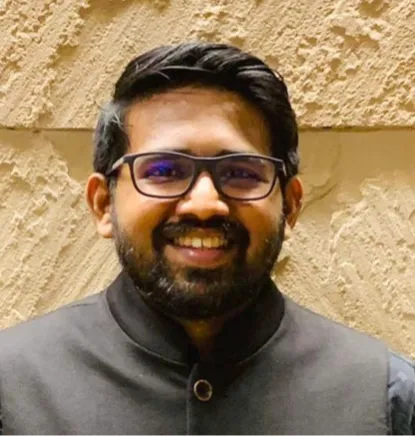-
CENTRES
Progammes & Centres
Location
As the Indo-Pacific region grows in prominence, all the members of the CSC, which are democracies, will continue to play their cards based on domestic and external benefits.

In early December, India’s National Security Adviser (NSA), Ajit Doval, took part in the sixth NSA meeting of the Colombo Security Conclave (CSC). The meeting reviewed the developments and progress made by the CSC in the last year and agreed upon a road map for the year 2024 to promote a safe, secure, and stable Indian Ocean. The meeting also included member-states, Mauritius and Sri Lanka, and observer-states, Bangladesh and Seychelles. The Maldives, now under a new dispensation, was the only member-state that was absent, underscoring the impact of domestic politics over regional collaboration. It is imperative for India to continue pushing for a proactive CSC to address the challenges in the Indian Ocean.
The CSC underscores the evolving dynamics of the Indian Ocean. The organisation came into its own in 2011, with Sri Lanka joining India and the Maldives for a trilateral maritime security grouping but came to a standstill after 2014 due to rising tensions between India and the Maldives. In 2020, India not only pushed for the revival and institutionalisation of the organisation but also expressed interest in expanding the CSC to Mauritius, the Seychelles, and Bangladesh. The push for the CSC demonstrates India’s evolving strategic vision for the Indian Ocean. The Indian Ocean is at the heart of an evolving multipolar world today, with extra-regional powers competing to make inroads in the region. This competition will further increase as the Indo-Pacific’s importance grows.
India not only pushed for the revival and institutionalisation of the organisation but also expressed interest in expanding the CSC to Mauritius, the Seychelles, and Bangladesh.
For India, a traditional power in the region, the CSC offers an opportunity to strengthen its leadership and security architecture. Since its independence, India has played an increasing role in promoting security in the Indian Ocean. The lack of capacity of island nations to secure the seas and counter transnational threats has continued to motivate India to assist them in defence and security-related capacity building, infrastructure development, and equipment provision. India has also played a vital role as the first responder in the region, be it to avert coups or to offer humanitarian and economic assistance during COVID-19 and multi-faceted crises. The CSC offers India an opportunity to institutionalise its role, shape the regional security architecture, and better address the existing and emerging threats.
China is another crucial reason for the revival of CSC. Since the early 2000s, Beijing has invested substantively in the Indian Ocean with its Belt and Road Initiative (BRI) projects, helping it access the Indian Ocean. Beijing’s outreach to the Indian Ocean is to control the crucial sea lines of communication and trade and to limit India’s influence and presence. Today, China is not only strengthening its naval capabilities; it also maintains strong defence relationships with states in the Indian Ocean region and also conducts regular maritime exercises in the Ocean. It has established a base in Djibouti and controls Sri Lanka’s Hambantota port. It continues to use scientific ships to map the Indian Ocean bed. Finally, it also wants to counter the prevailing security architecture in the Indian Ocean by institutionalising its presence through platforms such as the Indian Ocean Region Forum on Development Cooperation.
China is not only strengthening its naval capabilities; it also maintains strong defence relationships with states in the Indian Ocean region and also conducts regular maritime exercises in the Ocean.
Despite expressing concerns about some of these developments, India realises that many regional countries do not necessarily consider China a threat. They are also too dependent on China to have an overt anti-China policy. As a result, the CSC has focused on five pillars — maritime security and safety; countering terrorism and radicalisation; trafficking and transnational crime; cyber-security and protecting critical infrastructure, and humanitarian assistance and disaster relief. It is with these sectors of cooperation that India hopes to better understand and respond to threats from the Indian Ocean and continue being a preferred partner for the Indian Ocean states.
This strategic accommodation and flexibility is, in fact, contributing to the security of the Indian Ocean. Since 2021, the CSC has investigated terrorism and terror financing, narcotics trafficking, cybercrime and security, marine pollution, maritime law, and coastal security. In 2022, for the first time, the organisation held a conference of oceanographers and hydrographers and another conference on coastal security. The next iterations of these conferences are scheduled for 2024. Joint working groups have already been established, or are being finalised, on terrorism, cyber-security, humanitarian aid and disaster relief (HADR), trafficking and transnational organised crimes. Apart from regular NSA and Deputy NSA meetings, the countries are collaborating on capacity-building in sectors such as counter-terrorism, police, law enforcement, and cyber-security.
Yet, the CSC, as a young institution, remains vulnerable to domestic political changes in its member-states. The Maldives’s absence from the recent meeting is an example of this vulnerability. Two reasons would have likely contributed to its decision: first, to prefer a close relationship with China, or second, to live up to the expectations of the nationalist campaign that have pledged to distance the Maldives from India on defence cooperation. But, this use of nationalist and pro-China cards is not exclusive to the Maldives. All the members of the CSC are democracies, and these countries play and will continue to use both the cards for their domestic and external benefits as the Indo-Pacific region grows in prominence. For New Delhi, whose ambitions, responsibilities, and threats have increased significantly in the last decade, the CSC will remain an important instrument to help it consolidate its regional leadership.
This commentary originally appeared in The Hindu.
The views expressed above belong to the author(s). ORF research and analyses now available on Telegram! Click here to access our curated content — blogs, longforms and interviews.

Professor Harsh V. Pant is Vice President – Studies and Foreign Policy at Observer Research Foundation, New Delhi. He is a Professor of International Relations ...
Read More +
Aditya Gowdara Shivamurthy is an Associate Fellow with the Strategic Studies Programme’s Neighbourhood Studies Initiative. He focuses on strategic and security-related developments in the South Asian ...
Read More +